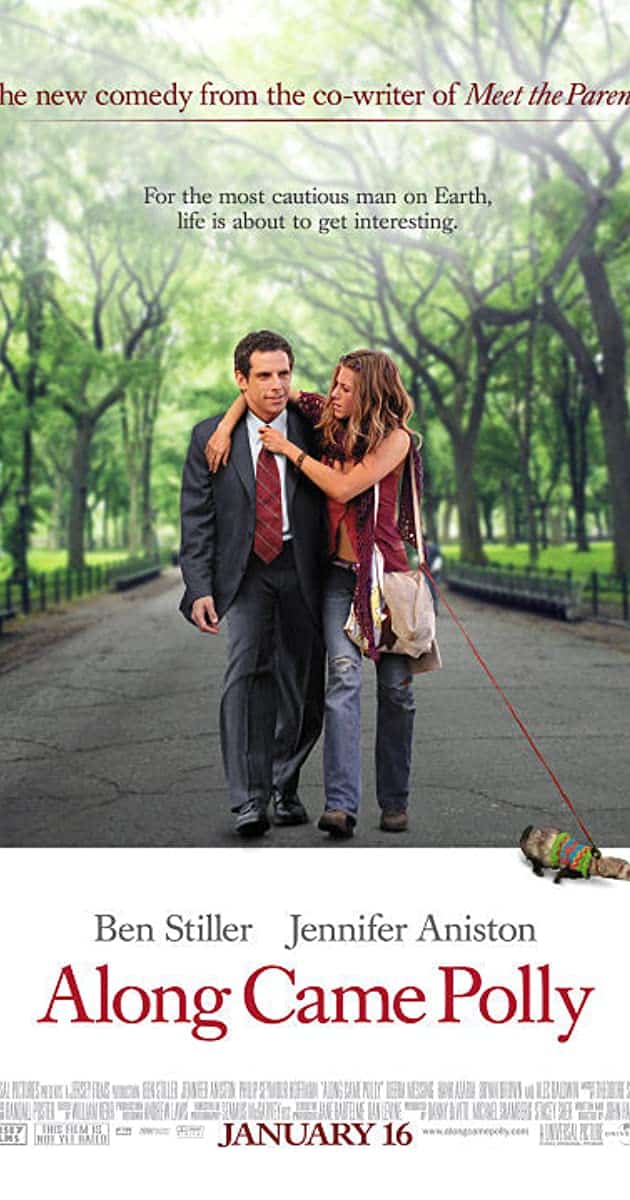“Along Came Polly” is a bit of a bumpy ride, but at the end of it you’re still able to say it was enjoyable. It maintains your interest despite some superfluous plot developments and cut-rate soul searching thanks to its genuinely likable characters.
Semi-neurotic Reuben Feffer (Ben Stiller) is a risk analyst at an insurance company in New York. He has his whole life planned and he spends his time minimizing risk, or eliminating it altogether, from all aspects of his existence. He has a number of pillows that must always be placed on the bed, and in their cabinets, the exact same way every time. He uses a numbers-based rationale in explaining why nuts or mints from public places should not be eaten. Could he possibly, through an attractive free spirit (Jennifer Aniston), learn to let loose a little?
I believe you can guess the answer. Roger Ebert sometimes reminds his readers of this key rule of his criticism: it is not what a film is about but rather how it is about it. And for the most part, “Along Came Polly” marches toward its final scene in entertaining enough fashion, with a fair amount of help from Philip Seymour Hoffman and a ferret with bad vision. It’s just that we could have done without, for example, dialogue from Reuben’s dad that spells out as if we were slow-learning schoolchildren what the grand Message is here.
The movie begins as Reuben is marrying Lisa (Will and Grace’s Debra Messing), and we follow the pair as they go to the Caribbean island of St. Bart’s for their honeymoon. Soon after they arrive, though, Lisa cheats on him with a scuba instructor (Hank Azaria). Understandably more than upset, Reuben goes back to single life in New York, receiving questionable advice from his best friend Sandy (Hoffman), a former child actor. The accomplished Hoffman brings outrageous life to his down-and-out character, notably when his delusions of fame bring chaos to a community theater play he’s involved in.
Sandy takes Reuben to a party where he has a chance encounter with waitress Polly Prince (Aniston), who he went to grade school with. Polly has been leading a bohemian life that took her to Sri Lanka and Buffalo among other fine places. Somehow, there’s an attraction, and they start dating. And so the rest of the movie is about the existential questions (and wackiness and toilet humour, it seems) that come up when opposites attract.
The problem is Polly’s character feels underwritten and underdeveloped. To describe her as commitment-phobic would be giving too much credit to the screenplay. Why exactly is she afraid of commitment, or is that how we should see her?
The film also leaves an impression of being drawn out but is saved by the chemistry and acting talents of Stiller and Aniston. The storyline where Lisa comes back and asks for forgiveness feels forced. I have rarely seen a comedy come to such an awkward halt as we’re supposed to wonder if Reuben will want her back instead of pursuing his relationship with Polly.
Rodolfo, Polly’s near-blind crash-test ferret, deserves a mention. I would have liked to see a little more of the troublesome creature (Stiller was bitten during the shoot). I will admit, and PETA please don’t be up in arms, that Rodolfo’s high-impact collisions with various obstacles generate some of the film’s numerous good laughs.
Written and directed by John Hamburg, who co-wrote “Zoolander” and “Meet the Parents”, this movie could be one of those romantic comedies that is soon forgotten. It is an innocuous offering that can be a nice change from heavy dramas or three-hour epics involving a hobbit and a ring. It is no doubt unspectacular, but there are more reasons for liking it than for putting it down.
Review by J-F Tremblay

